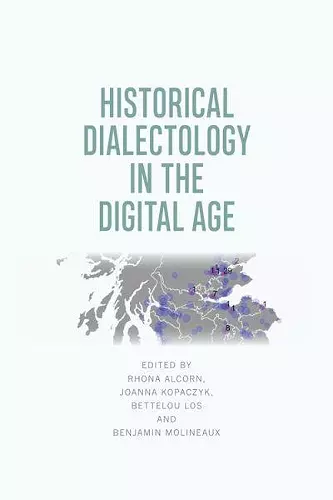Historical Dialectology in the Digital Age
Rhona Alcorn editor Joanna Kopaczyk editor Bettelou Los editor Benjamin Molineaux editor
Format:Hardback
Publisher:Edinburgh University Press
Published:30th Jan '19
Should be back in stock very soon

Edinburgh (now the Angus McIntosh Centre for Historical Linguistics), such as eLALME (the electronic version A Linguistic Atlas of Late Medieval English), LAEME (A Linguistic Atlas of Early Middle English) and LAOS (A Linguistic Atlas of Older Scots), this volume illustrates how traditional methods of historical dialectology can benefit from new methods of data-collection to test out theoretical and empirical claims. In showcasing the results that these resources can yield in the digital age, the book highlights novel methods for presenting, mapping and analysing the quantitative data of historical dialects, and sets the research agenda for future work in this field. Bringing together a range of distinguished researchers, the book sets out the key corpus-building strategies for working with regional manuscript data at different levels of linguistic analysis including syntax, morphology, phonetics and phonology. The chapters also show the ways in which the geographical spread of phonological, morphological and lexical features of a language can be used to improve our assessment of the geographical provenance of historical texts.
The present volume is a very valuable contribution to the field of English historical dialectology. It demonstrates that the door for the linguistic analysis of early and late medieval texts and their language has been opened anew. It shows that there is an opportunity for more nuanced questions and more precise insights through the options presented by digitised corpora and/or digital methods (as complements to traditional, analogue corpora and methods). The overarching question – namely how digital methods can be used to investigate diachronic variation and language change – is addressed at different linguistic levels. It is the interplay between spelling variation and pronunciation which comes to the fore, as it is at the heart of half of the contributions (chapters 4, 5, 6, 7, 8), but syntactic variation and change, as well as morphological and lexical variation, do also find their places. The individual chapters all present their data and analyses with clarity and conciseness...All in all, the volume is a very good collection of papers, and it will be a handy and useful resource for students and more experienced scholars interested in the state of the field and what one can do with digitised corpora and digital methods. -- Ulrike Krischke, Ludwig-Maximilians-Universität München * Anglia, 2020, 138(1) *
The chapters in this volume provide a fascinating insight into the state of the art of historical dialectology, and, in the span of age and experience represented by the authors, ranging from Emeritus professors to doctoral candidates, reassure us that the future of this discipline and the legacy of Angus McIntosh are in safe hands... Historical Dialectology in the Digital Age thus gives the reader a greater understanding of the past and an intriguing glimpse into the future of historical dialectology. It will be of interest not only to historical linguists, but to those working with linguistic corpora of all kinds. -- Joan Beal, University of Sheffield * English Language and Linguistics *
Overall, Alcorn, Kopaczyk, Los, and Molineaux have brought together a great collection of papers that function as an excellent introductory work to the tools and methods available to the historical dialectologist working in the digital age. This volume both shows the value that digital methods hold for the study of historical linguistics and simultaneously underlines the need for new tools to continue to be developed. With its varied collection of contributions and contributors, this volume will appeal to both advanced scholars in the field of historical linguistics who are interested in keeping up with recent developments in the field, as well as to those wishing to acquaint themselves with the various tools and methods that are available. In short, HDDA is a valuable contribution to the field of historical dialectology and will hopefully serve to introduce its readers both to the true and tried methods of digital linguistic research as well as to new and exciting possibilities. -- Berber Bossenbroek * English Studies, 101:2, 252-254 *
Historical Dialectology in the Digital Age illustrates how historical dialectology has profited from the field’s speedy willingness to embrace and develop new digital technologies, and much of that initiative has come from the Angus McIntosh Centre for Historical Linguistics. Despite its focus on English and Scots, researchers working on the historical dialectology of other languages will benefit greatly from reading this volume. -- Marcelle Cole, Utrecht University * Journal of Linguistics *
This volume brings historical dialectology fully into the digital world. Not only do we learn about aspects of Medieval and Early modern varieties of English and Scots, but also the latest methods in corpus construction, tagging/annotation and analysis — making it essential reading for a wide array of historical linguists. With breadth yet no loss of coherence or depth, this volume can assure us that Angus McIntosh’s legacy is in good hands. -- Professor Jonathan Culpeper, Lancaster University
ISBN: 9781474430531
Dimensions: unknown
Weight: 582g
292 pages